Peanut Butter Puffs for Safely Introducing Peanuts to Babies: A Conversation with @puffworks founder Greg Murphy
- Why food is preferable to supplements and powders when it comes to helping babies prevent food allergy
- How Puffworks baby ingredient line and manufacturing process differs from other puffs on the market
- What steps parents can take to help babies prevent food allergy with food

LISTEN TO THIS EPISODE
Episode Description
Early introduction of peanut protein for babies helps prevent against peanut allergy. But how do you safely introduce peanuts if thick globs of peanut butter are a choking hazard for babies?
Greg Murphy, serial entrepreneur and food allergy dad is the founder and President of Puffworks, a company he started when he decided he wanted to improve on existing puffed peanut butter snack foods. Little did Greg know how important Puffworks Baby would become as an ideal way to use food to help prevent food allergies in babies!
In addition to the Puffworks Baby peanut butter puffs, the company recently launched an almond baby product, ideal for introducing babies to another of the potentially allergenic food categories: tree nuts. In this episode Greg is chatting about the ups and downs of running a small but mighty food business, why he prefers using food vs. supplements or powders to introduce babies to allergenic foods and other innovative ways to use foods to help prevent food allergies in babies.
About the Guest
- President of Puffworks since 2017
- BS in Accounting & Finance from University of Oregon & MBA from Portland State University.
- Follow on IG @puffworks
- Follow on Twitter
- Since 2018, puffworks has expanded to over 1,000 retail stores, found in various stores: LINK & Amazon
Links from this Episode
- Check out Puffworks line of products on their site www.puffworks.com and use code 20BABYLED for 20% off (this is my affiliate code).
- Baby-Led Weaning with Katie Ferraro program with the 100 First Foods™ Daily Meal Plan, join here: https://babyledweaning.co/program
- Baby-Led Weaning for Beginners free online workshop with 100 First Foods™ list to all attendees, register here: https://babyledweaning.co/baby-led-weaning-for-beginners

Latest Episodes
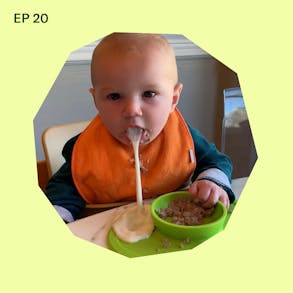
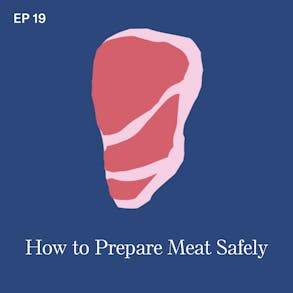
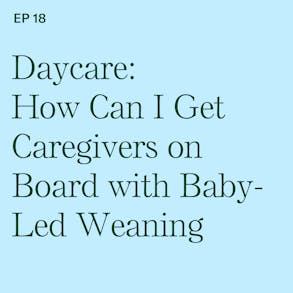
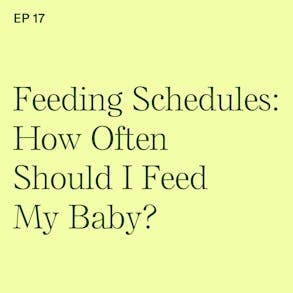
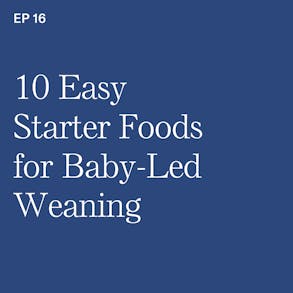
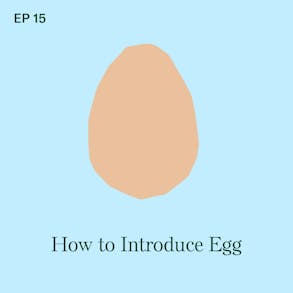
Greg Murphy (0s):
You know, as you can get older two years, three-year-olds your advice as to continue to introduce Peanut, it's just much more sustainable to do it with a food product than it is with a supplement.
Katie Ferraro (13s):
Hey there, I'm Katie Ferraro, Registered Dietitian, college nutrition professor, and mama of seven specializing in baby led weaning. Here on the Baby-Led Weaning Made Easy podcast I help you strip out all of the noise and nonsense about feeding, leaving you with the competence and knowledge you need to give your baby a safe start to solid foods using baby led weaning. Hey guys. Welcome back today. I'm chatting with Greg Murphy, the founder and president of Puffworks here in Portland, Oregon company that made Peanut Butter Puffs. And the baby line is perfect for introducing a peanut protein safely, too, your baby, but they didn't start out doing a baby stuff.
Katie Ferraro (56s):
Greg story is really interesting. He's a serial entrepreneur who has a background in craft and artisanal foods. He had tried Bamba the Israeli Peanut Butter Puffs brand, and thought he could make a better peanut butter snack food. Greg also happens to have a daughter with food allergies, including a tree nut allergy. So, down the road with that Puffworks concept, Greg got hooked into this idea, and then the research that we know that feeding babies, peanut protein early and often is ideal for helping to prevent peanut allergy. So they kind of modified the products to make an off shoot on the line called Puffworks baby. So that's the no added sugar, very low salt peanut butter puff that a lot of you guys use or maybe have seen if you haven't, it's really cool because it's super easily dissolvable in the baby's mouth.
Katie Ferraro (1m 38s):
So the Puffworks baby product actually launched right after my youngest babies are twins. Gus and Hannah. They are a sixth and seventh kids. I'd always done Bamba prior to that, but it was really impressed by the Puffworks baby products. They actually reached out to Puffworks if I had a great relationship with their brand for a number of years now, but I always like to learn more about the people behind the brands that I'm supporting endorsing giving my money to. And that's what exactly why I wanted to bring a Greg on. So I am in affiliate for Puffworks. I wanted to disclose that. And if you want to check out anything from Puffworks, my discount code is babyled. They just launched an almond product for babies, which is really exciting.
Katie Ferraro (2m 20s):
And that code babyled works for 10% off everything at Puffworks dot com. Plus they have free shipping. So with no further ado, I want to introduce you guys to Greg Murphy, the founder and president of Puffworks to talk a little bit about using puffs, to introduce peanuts and now almonds safely, two babies. All right, well hello, Greg. Thank you so much for joining me.
Greg Murphy (2m 44s):
Hi, Katie. Thanks for having me.
Katie Ferraro (2m 46s):
Could you tell us a little bit about yourself and how you came to be the founder of the company? We all know and love Puffworks
Greg Murphy (2m 52s):
Okay. Sure. So I've been a, in the food industry, most of my life, you know, working with craft food companies and you know, everything from a specialty coffee to a craft beer and tea and spices. And I was a few years ago, they were looking for another opportunity in the food business and got introduced a friend of the industry to the Bamba, a product from Israel. And it was really fascinated with a product because you know, it, it tastes great and it's a, it's a good for you. And I thought, ah, you know, opportunity to, to make a better Bamba product and bringing it to the us, you know, to make it with all organic ingredients, fresh roasted peanuts, that type of thing. And then a few years ago, you know, or about the same time a friend introduced, you know, a pediatrician friend of mine, you know, saw what I was thinking about doing instead of a thing, you know, this is a great, you know, you, you know, the new science has actually introducing peanuts early as key to preventing peanut allergy later in life.
Katie Ferraro (3m 46s):
Where are you interested in Bamba? Like just as a food outside of the food allergy prevention piece of, okay. That's so interesting because as a dietitian, and for those of you, you don't know, a Bamba is a peanut puff product made out of Israel and it's very common in Israeli food culture, children start eating the Bamba puffs early and often. And then they did the leap study and found out, gosh, you know, these children or having much lower rates of peanut allergy. And it appears to be because Peanut early and often is protective. So I always thought like, why isn't there like a better version of this, but from the allergy stand-point but you are actually interested in it, like from like a taste or marketing sampling?
Greg Murphy (4m 23s):
Yeah. I started with it from the snacks standpoint, but it, Hey, this is just a great touchdown snack, but it's also a good for you and you, know, it actually was in a few months after that, that I met a pediatrician and he recommended that we also make a baby products Introducing
Katie Ferraro (4m 38s):
Is this Dr. Sunog because my audience knows him, but he did it all of our episodes about food allergies. Okay. So you were originally interested in a peanut butter snack puff product, and then you figure it out like, oh my gosh, this is like a hugely important in the world of baby food. Cause I'm always like, oh, it's the most important thing in the world, the baby food. And everyone knows
Greg Murphy (4m 57s):
You mean at the time I was doing it, the Leap study has just come out. Right. So you, no, it wasn't really aware of it. And you know, once I met Ron and he, we sort of talked it through, it was like, oh, this is fantastic. You know, I have a daughter that actually has nut and seafood allergies because you know, when I was raising my kids, the advice was to just avoid feeding allergens.
Katie Ferraro (5m 15s):
So your daughter has a peanut or a tree nut allergy or both?
Greg Murphy (5m 19s):
Tree nut allergy
Katie Ferraro (5m 19s):
Or did she grow out of it?
Greg Murphy (5m 21s):
She still has it.
Katie Ferraro (5m 23s):
Okay.
Greg Murphy (5m 23s):
Yeah.
Katie Ferraro (5m 23s):
So tell us a little bit about the line of Puffworks. I think my audience is pretty familiar with it. Puffworks makes a baby peanut butter puff that we use for safe introduction of peanut allergy, to babies, but you guys of other products too, is that correct?
Greg Murphy (5m 35s):
Yes
Katie Ferraro (5m 36s):
I know it's correct. Cause I love them, but you tell them about it.
Greg Murphy (5m 39s):
You know we have the, the baby peanut product for introducing the peanut and we actually just came out with an almond product and then we have a, what we call our kids snacks packs, which has like a, you know, like a crunchy version of the baby product. You know, that's also what we make it, a peanut butter. And then we make a peanut butter and jelly and we actually make a peanut butter and honey, and then for our snack line, which has, you know, sort of a family size bags to those same products plus a dark chocolate product.
Katie Ferraro (6m 4s):
Is it, are there any plans for peanut butter and banana?
Greg Murphy (6m 7s):
Yes. When we look at expanding the kids line, I think that'll maybe very likely to be the next one that we do.
Katie Ferraro (6m 12s):
And I know we talked a lot about Puffworks or at least in my community because of the Puffworks baby products. So you guys look, it's an orange package. It, it, it has a turquoise elephant on it. That's the baby one. And we use that for the introduction of peanut protein for babies when they start solid foods around six months of age. But I have kids who are aged three to six and I love the snack line for kids because there is very minimal amount of added sugar. And you are very hard pressed to find a snack that comes in a package that doesn't have added sugar for kids. And I really do love the products beyond baby, because it is like one of those few packaged snack products that I can actually feel good about serving my kids.
Greg Murphy (6m 49s):
Yeah. That's what we really, what we try to do with the with the kid line and the original peanut butter, does it have any added sugar at all. And then the, you know, PB and J has just three grams. It's mostly just strawberry.
Katie Ferraro (7m 1s):
And I think parents oftentimes will get introduced to Puffworks when they hear about Puffworks baby, but I will remind them like, listen, they have these other products that I think to be honest, nothing to spare to go against Puffworks baby, but they taste like stale Peanut Butter Puffs, but it's because they're not designed to be all very salty and very sugary babies love them. I'm sure you are just like, I can watch videos of babies eating all foods all day, but I love to watch them eat the Puffworks baby cause they love it. And there is no salt and there was no sugar. They are actually learning to taste the flavor of peanut
Greg Murphy (7m 29s):
That's right. I mean, you know, it is an adult with it, you know, more developed a pallet, you know why they probably taste it a little bland. 'cause it's a very low sodium in there, but you know, we put a little more sodium and the kids snacks and the adults snacks
Katie Ferraro (7m 41s):
But it's not a lot by any means. Like I'm totally like very much a stickler about reading labels for kids. Now. It makes it easy. I guess it makes it easy for me to like no not having that, and I'm not even a big peanut butter and jelly person, but the peanut butter and jelly flavor, again, there's just a smidge of added sugar. I think it's not even a teaspoon of sugar per serving. It's really flavorful, but not like overwhelmingly sweet. Like a lot of jelly stuff is
Greg Murphy (8m 4s):
Yeah. We've tried to really make that balance and I'll make it a really wholesome snack there, but we want it to taste great. So we do add just a little bit of sugar.
Katie Ferraro (8m 10s):
You were talking a little bit about the ingredients in the Puffworks products, or did you tell us just a little bit about how you source them if the ingredient line was important to you? Cause you mentioned you come from a background of craft foods and I just wanna clarify that it's not like the craft food company, you mean craft with a C, right.
Greg Murphy (8m 24s):
So what does the craft or the a C or artisan, would it be the other way to say it. So, you know, we're, we're really sticklers about how we make our product and how we source the ingredients. Everything is a a hundred percent of organic and what it was different about our product or whatever they set out to accomplish. When we started to make Puffworks is we make it with just a, a a hundred percent fresh roasted nuts. So, you know, whereas a lot of other products will add oil or, or they'll add you know dehydrate to nuts and use nut flour. We just use a a hundred percent dry roasted nuts, peanuts, almonds, so that you really taste the, the natural flavor of those ingredients.
Katie Ferraro (9m 0s):
Can you talk a little bit about the sodium the way I always describe it to you? Like, well then why is or salt in it? But it's for babies are like, okay, it is packaged product. So there is a smidge of sodium for preservative purposes. Is that how you would describe it? Or am I getting that wrong?
Greg Murphy (9m 13s):
You know, I think we, we, you know, it, it's not that the sodium probably doesn't help preserve the product, you know, we gave it just a little touch of salt, you know, just so for the taste really. Okay. No, because we figured that the baby is going to eat it, but mom's also
Katie Ferraro (9m 26s):
They do. I know they love it. And the, the big kids, you gotta be careful cause they sneak it in like, no, this one's for the baby. I'll get you your own. Okay. So Greg, a lot of parents will ask about it. There's all these products on the market now kind of flooding the market that are the stick packs that have X, Y or Z amount of the, of X, Y, or Z allergen. And you pour it into the bottle. I mean, I personally am a dietitian, so I'm an advocate of a food first approach and using food's to help prevent food allergy. And I know Dr. Sunog is as well, but what would you say to parents who are like, should I be using a stick pack or should I be using Puffworks to introduce peanut to my baby?
Greg Murphy (9m 57s):
Yeah. Well, so we're very much a food forward brand. I mean, we're a food first and what we really believe that, you know, to have a better relationship with food and prevent food allergies, it's really about food. It's not about supplements or powders. And then, you know, as you can get older two years three-year-olds and the, the advice was to continue to introduce Peanut, there's just a much more sustainable way to do it with the food product than It is what is a supplement or powder.
Katie Ferraro (10m 23s):
And I, know, I do a whole, a hundred first foods approach and really advocate for the use of food. Like, oh, it's so ironic. We would use food to teach. Babies' how to eat. We would use food to prevent food allergy, but its kind of crazy that in the admin of, you know, baby food and you go to target and there's this whole aisle of pouches. And to be honest, you don't need any of it that babies can learn how to eat food. Sometimes people will give me a pushback. Why aren't you doing peanut butter? That's a real food. Why or why? Why are you recommending packaged products? Listen, there is lots of ways that you can safely introduce peanut to your baby. One of them is a peanut puff. Yes, it does come out of a package. The majority of the food that we feed babies don't come out of a package, but I really liked the very clean ingredient list for Puffworks. And so I was curious if you could share maybe a little bit about the other attributes of the package the parents might take into consideration is like, oh it's a packaged snack.
Katie Ferraro (11m 9s):
I can't feed it to my baby.
Greg Murphy (11m 11s):
Okay. We strive to make a really super clean products. So it's a a hundred percent organic non-GMO kosher gluten-free and you know, just very simple, minimal ingredients, you know, the original, it really just three ingredients, its just peanuts, corn and salt. And you know, we don't process the peanuts by separating flour and the oil, anything like that.
Katie Ferraro (11m 34s):
So you've recently added almonds to the line of peanuts. So there's peanut Puff's that have corn. The parents will ask me, you know, should I do corn before I do peanuts? And I do recommend doing one new food at a time. There's lots of Safeways to introduce the baby to corn. Once you've done corn, no reaction, again, a very unlikely baby is going to react to corn. Then you can use the Puffworks peanut puffs to introduce your baby to peanut. Now you guys have added almond. You tell me a little bit about how that came to be. Why did you go with almond versus other tree nuts, maybe?
Greg Murphy (11m 60s):
You know, We want to do a product to introduce tree nuts and we select the, the almond you, it basically we tasted a lot of different products and we really thought, you know, almond has a great taste. It does introduce children to tree nuts and we put just a small amount of peanut butter in it so that ah, you know, there is no cross contamination risk or there may be a cross contamination risk on how we manufacture it. So when it makes sure that people, you know, understand that there could potentially be peanut in the product.
Katie Ferraro (12m 27s):
And I know with almond coming out, people can be asking a lot of questions like do I do almond first? But the almond has a peanut. No, no. We have a very, very strong data for the early introduction of peanut as a way to help prevent peanut allergy, there is less significant data about tree nuts. However, there is no benefit to withholding tree nuts. And so Dr. Sunog and myself or other feeding professionals, all the guidance is moving towards early introduction of all of the allergenic foods because there's no benefit to withholding. So I would recommend parents do peanut first and then Almond but you have to understand it. Like Puffworks, doesn't have to entirely separate facilities one for peanut and one for almond. And because of the inherent risk of cross-contamination does exist.
Katie Ferraro (13m 9s):
It just makes sense to put peanut in the product because it probably would have been exposed to it. You can't say it's a a hundred percent peanut free unless it's in a separate facility. Is that correct?
Greg Murphy (13m 16s):
That's correct. And you know, when we just wanted to make you not take, have to take any risks that, you know, somebody is going to expose to peanuts.
Katie Ferraro (13m 26s):
And we generally recommend introducing one new allergenic food at a time. And I always remind parents, you don't need to wait three to five days between introducing new foods. If a baby is going to have an allergic reaction to a food, it will occur within minutes or up to at most two hours after that ingestion, it's not going to be three to five days later. And so we're moving away from that recommendation and doing the foods early and often the allergenic foods, you do want to build on a path to observe. So I wouldn't do like peanut in the morning and almond and the afternoon for the first time. Cause a baby she reacts, how would you know? But a few days later it's absolutely safe. Babies can eat so many more foods than we give them credit for and they can eat them more frequently than a lot of pediatricians are recommending. So tell me, how did you get to meet Dr. Sunog? Because again, my audience is familiar with him. He comes on a lot to answer questions about food allergies.
Katie Ferraro (14m 9s):
We teach workshops together. I have a program together. How did you like to run into him and decide to kind of join forces with the baby food allergy prevention world?
Greg Murphy (14m 18s):
No, it was by happenstance, really it as just a mutual friend, a new, what I was working on had met Dr. Sunog and knew what he was working on. And it was like, wow, this is just a natural fit. And so we started talking who collaborated and launched the baby product. So Ron is a medical advisor at Puffworks
Katie Ferraro (14m 35s):
One thing that I like about Puffworks does that you guys used credentialed healthcare professionals to provide your nutrition and feeding information. And I know it sounds ironic that other outlets out there don't, but it is very important that you're getting your information about introducing new foods to your baby from credentialed professionals like dietitians, like pediatricians who will have additional training, because the reality is a majority of doctors in the United States, 90% of them have not taken a dedicated nutrition class. So your lucky that you joined forces with Dr. Sunog or a doctor who has again, a special interest in actually using food to prevent food allergy. And that's the subtitle of his book is it's eat the eight; preventing food allergy with food and the imperfect art of medicine, because there is a lot of gray area here.
Katie Ferraro (15m 19s):
And I was curious if that's been surprising to you as a serial entrepreneur with a background in food products, does it kind of surprise you what companies tried to say and get away with as far as like the health attributes of their product?
Greg Murphy (15m 32s):
Oh, I think of, as you know, there's plenty of examples of companies that are pushing the envelope in terms of the health attributes of it. I think our biggest attributes, we just try to keep it clean and simple and nutritious. I mean, that's, that's it,
Katie Ferraro (15m 45s):
I think Puffworks is definitely one of those brands. I mean, it is word of mouth spread people be like, oh, I saw on Instagram, what are those puffs? And I remember, so Holly, from your team reached out to me. I have seven kids. I have a six-year-old I have a five-year-old quadruplets when I have a three-year-old twins. And I did baby led weaning with my quadruplets, which was how I got into this. And I shifted the whole focus of my career to concentrate on baby led weaning after that, because it has been such a transformative experience for our family. When my twins were doing baby led, weaning, you guys had just launched the baby product. And I was the same thing. I was like, how is there not a better product than Bamba out there? Like how are we recommending this product that has so much salt in it to the baby's like, it looks like a safe way, but there's got to be a better one. And then like out of nowhere, Holly got in touch with me.
Katie Ferraro (16m 25s):
And so I've been connected with you guys, I think since the beginning of the baby product, but it's been a while.
Greg Murphy (16m 30s):
No, I don't. I'm not even sure that we can fully launched it at that.
Katie Ferraro (16m 32s):
You know, I, you know what, my babies that we actually got the other product first before you came out with babies and on my earliest pictures of the baby is trying puffs are the ones that are not the baby product has a smidge more sodium
Greg Murphy (16m 44s):
There were the adult products. Nice. Yeah. Then I remember that
Katie Ferraro (16m 47s):
I think the baby lion is spot on. I mean, it is, it just takes a little bit, we say it takes the stress and the mess out of introducing Peanut's to a baby. And our goal was not to prevent then that's what baby led weaning. But I, for one do not feel comfortable serving peanut butter or to a six month old, you can modify it to make it safer and make it less sticky. But at the end of the day, we want to introduce Peanut early and often. So having a Peanut Butter Puffs, I think is a safe way to do that.
Greg Murphy (17m 12s):
Yes. And just to make it easy to, for them to pick up and hold and you know, have a snack
Katie Ferraro (17m 16s):
And because some parents say, well, wait a minute. I thought puffs were kind of antithetical to the baby led approach. And when we're talking about puffs, I'm talking about some of the big major food brands that make those little tiny star shaped puffs, which crazy, if you think about it, because they call it a first food except, a baby requires they're a pincer grasp to pick up a very small piece of food. We don't feed very small pieces like that early on. They are pure starch, oftentimes which added sugar and salt that could become lodged in the babies throat. They are a huge choking hazard when people say what there isn't, Puffworks a puff and I always have to describe it. No, it shaped more like a cheeto or an adult pinky finger. That's a important size that babies can use their whole hand grasp to rake and scoop up and feed themselves, which is completely in line with a baby led weaning philosophy.
Katie Ferraro (17m 59s):
So I don't know if you did it on purpose, but it's like the perfect size for baby's to feed themselves.
Greg Murphy (18m 5s):
Yeah. We spent a lot of time thinking about how to make our puffs. You know, they, and, you know, there was the, you know, probably took us about nine months to develop, but the process in terms of who, you know, this size and how easily it, they dissolve, ah, you know, we're kind of a perfectionist about our puffs
Katie Ferraro (18m 21s):
What is something parents might be surprised about as far as like the whole manufacturing process? Like I know you can go online, Puffworks.com get a case of baby puffs. Cause I'm going to be starting peanut and it shows up at the door, like, it just seems like to run so smoothly. What sort of hiccups, if you don't mind sharing, if you guys had along the way to bring this product to market?
Greg Murphy (18m 38s):
Oh, I mean, you know, it's, you know, it, it's always more difficult than you think. You know, we had a couple of trials in the beginning of that didn't work, you know, and we actually take a step back and figure out a different way to make our product
Katie Ferraro (18m 50s):
Like what didn't work? The coding or the wait or the nutrition, like what was it ?
Greg Murphy (18m 54s):
You know, when it didn't work as we, we just, weren't happy with the dissolve-ability of the past when we first started to do it. And so we kind of had to take a step back and really work on how much pressure we are going to put behind the product when we'd have to it and all of those kinds of things. And then I think we've kind of, we've definitely seared in on it now.
Katie Ferraro (19m 11s):
Oh I think it's amazing. One thing I learned from working with Dr. Sunog, who was a medical advisor to Puffworks is that it is the softest baby peanut puff on the market. And I think that gives parents a sense of relief in that. Okay. Obviously babies don't have teeth when they start solid foods, they can munch chew with their gums. But these are, this is a product that dissolves on their tongue. They are going to actually learn how to choose it. And for some of babies, it's the first quote, unquote crunchy food that we have. Like I do it on the first week of the solid foods, but its perfectly safe or babies who have, and almost all other crunchy foods, we don't feed the babies here's is on the crunch of your side, but it still dissolves.
Greg Murphy (19m 47s):
Yeah. We do a dissolve test every time we make a batch and say, okay, can we dissolve, will that dissolve in less than 10 seconds?
Katie Ferraro (19m 54s):
How does a dissolve test work? And then what's the other like measures that you have to determine, okay, this is a crunchy enough, but not too crunchy?
Greg Murphy (20m 2s):
Oh you know, I mean the dissolve test is a very scientific, you know, we put it on our tongue and count, you know start the stop watch
Katie Ferraro (20m 10s):
But you try every batch ?
Greg Murphy (20m 11s):
Yes. But then there's a lot more parameters to it. You know? So we monitor the pressure when they, you know, that its cooked under the monitor or the circumference of it are they monitor the length of it and we monitored the density of it. So how much, you know, what's the weight of you know, 20 puffs.
Katie Ferraro (20m 28s):
In the facility where are you guys produce Puffworks, is it a nut and peanut only? Is that pretty hard to maintain those standards? Because obviously it was always a concern for cross-contamination or when we're talking about allergenic ingredients.
Greg Murphy (20m 38s):
Yeah. We, you know, so we have a, we have our own production room within a SQF, a level three food manufacturing facility. And so we have peanuts and tree nuts in that.
Katie Ferraro (20m 51s):
So Greg, you've got that baby line, you've got a peanut butter and jelly, a couple of other ones for adults, bigger kids, etcetera. Anything else coming down the line after almond, as far as being a baby specific puff product?
Greg Murphy (21m 2s):
We're always thinking about new products, you know, a specific to the baby line. I think it's, you know, there's probably will have like the, they will come out with it, another tree nut, a product like a cashew or something like that and then we're also thinking, always thinking about products for the snack line. So, you know, it's likely that if the kid's line, when they do it, like you, you mentioned a banana product or peanut butter and banana product, I can see the walls are probably do an almond product for our snack line.
Katie Ferraro (21m 26s):
So Greg, where can listeners go to learn more about Puffworks and the wonderful work of your team is doing?
Greg Murphy (21m 32s):
Well certainly you go to our website Puffworks.com. It's probably the best, the best place to learn more. And what would just reach out, reach out to us directly at info at Puffworks.com.
Katie Ferraro (21m 40s):
We'll thank you so much, Greg. This has been a great conversation.
Greg Murphy (21m 44s):
Thank you very much, Katie.
Katie Ferraro (21m 45s):
Well I hope you guys enjoyed that interview with the founder and president of Puffworks Greg Murphy. I don't know about you, but I always love hearing more about the stories behind the brands and products that I use for my family and in my work as well. So if you want to check out the Puffworks baby line, they've got the peanut, what I've had for a while, but now that brand new almond would go to Puffworks dot com. My affiliate discount code is babyled, babyled to get 10% off. I think it's great to have a case on hand. If you're going to be a starting peanut, when your baby there's lots of safe ways we can do peanut for babies, but the Puffworks baby Peanut Butter Puffs. But it certainly one of my favorites. I hope you guys enjoyed this interview with their president and founder, Greg Murphy. Bye now!

The Program Baby-Led Weaning with Katie Ferraro
A step-by-step digital program for starting solid foods safely and navigating the original 100 FIRST FOODS™ meal plan with baby-led weaning.
 EXPERT-LED, PROVEN APPROACH TO EATING REAL FOOD
EXPERT-LED, PROVEN APPROACH TO EATING REAL FOOD CONCISE VIDEO TRAININGS TO MASTER BABY-LED WEANING
CONCISE VIDEO TRAININGS TO MASTER BABY-LED WEANING 100 FIRST FOODS DAILY MEAL PLAN WITH FOOD PREP VIDEOS
100 FIRST FOODS DAILY MEAL PLAN WITH FOOD PREP VIDEOS
Baby-Led Weaning for Beginners Free Workshop
Is your baby ready to start solid foods, but you’re not sure what to do? Register for this free online video workshop and learn how to give your baby a safe start to solid foods using baby-led weaning. Everyone on this free training receives a copy of Katie’s original 100 FIRST FOODS™ list. You can take this workshop right now, later today when your baby naps, or tomorrow…whatever works for you!
Get baby-led weaning recipes and tips delivered to your email inbox.